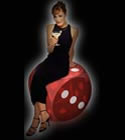Pairing the Door Card
1. If you are going high, pair your door card, and make trips, what should you do ?
Ans : Bet out and continue betting most of the way through the hand.
2. What if someone raises ?
Ans : You should reraise, unless it looks as though there is a good chance that you are beat.
3. What situation might indicate that you are beat ?
Ans : If the raise occurs in heads-up play and you are looking at three low cards.
4. If you are low and pair your door card, what might this enable you to do ?
Ans : To disguise your hand and perhaps to bluff a little.
5. What will the high card typically do in this situation ?
Ans : He generally will take one more card off. If you catch another low card (on fifth street), he usually will give up unless he has made at least two pair.
6. What if you catch a bust card on fifth street ?
Ans : The high hand almost always will play on, so you need trips or at least two pair to bet.
7. What is the bad part about pairing your door card when you have a low card up ?
Ans : You probably will be first to act the rest of the way.
8. What if you are up against other low hands and you pair your small door card ?
Ans : This puts you at a definite disadvantage.
9. If you pair your low door card and make trips, how should you play your hand ?
Ans : You should play is as though you had made big trips.
10. What if you have a big pairs in the hole ?
Ans : You should usually bet your hand all the way through.
11. When your opponent pairs his small door card, what does he usually have ?
Ans : Three low cards with a pair or two big pair. It is less likely that he has trips.
12. But if he is a tight player and continues to play very aggressively, what is his hand ?
Ans : He usually has trips or the two big pair.
13. In a multiway pot, what if the player on your immediate right pairs his door card ?
Ans : It puts you at a significant disadvantages during the hand.
14. Under what circumstances is this especially true ?
Ans : If this opponent is an aggressive player, or if he is a weak player who is liable to keep betting without the best hand just because he is high.
15. Since you might find yourself jammed in on a later round, what is necessary for you to continue playing ?
Ans : You must have helped your hand considerably on both fourth street and fifth street.
Introduction / Starting hands / Three of a Kind Wired / Disguising Your Hand / Ante Stealing / Getting Reraised on a Semi-Steal / When an Ace Raises / When the Bring-In Raises / General Strategy / How Far Do You Go? / Fourth Street / Check-Raising on Fourth and Fifth Streets / Fifth Street / Sixth Street / Seventh Street / Position / Playing the High Hands / Bluffing / Slow-Playing / Knowing Your Opponents / Raising Aggressively / The Toughest Decision of All / Staying to the End / Pairing the Door Card / Keeping Track of the Cards / Scare Cards / An Expert Play / Another Good Play / Reading Hands / Psychology / Afterthought


